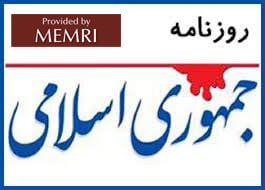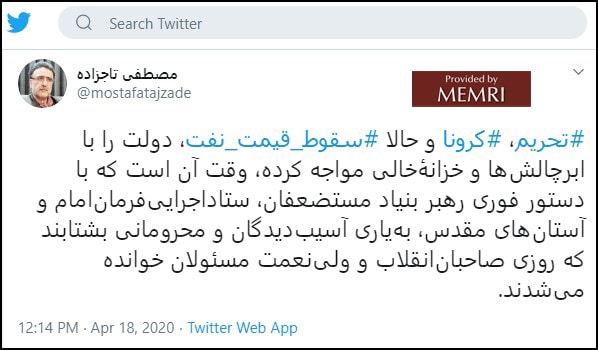
In the past weeks, Iran has been pressing the international community for financial aid to help it deal with the spread of the coronavirus pandemic in the country. In March 2020 Iran appealed to the International Monetary Fund for a $5 billion emergency loan to fight the virus.
On April 7, Iranian Supreme Leader Ali Khamenei approved President Hassan Rouhani's request of a $1 billion withdrawal from the National Development Fund of Iran for the fight against the pandemic. [1] The fund, established in 2011, holds Iran's foreign reserves estimated at approximately $90 billion, obtained from the country’s oil and gas exports.[2]
In light of the severe economic situation of Iranian society due to strict sanctions prompted by the regime's policy, coupled with the regime's mishandling of the coronavirus outbreak, there has been criticism within the regime itself over the failure of its charity funds, whose holdings are estimated in billions, to come to the aid of the hard-hit Iranian public. The criticism was voiced by the editor-in-chief of the Jomhouri-ye Eslami daily, Masih Mohajeri, by a former senior reformist official, Mostafa Tajzadeh, and by Majlis Member Bahram Parsaei. They urged Khamenei to immediately release the billions he controls for the benefit of Iranians and to fight the pandemic and the economic crisis. They pointed out that these funds, which are intended for the wellbeing of the poor and disadvantaged in Iranian society, do not reach them. These funds, it should be noted, benefit a small circle of Khamenei's loyalists and his project of exporting the Iranian revolution – namely of consolidating Iran's influence in the region and investing in other countries such as Syria and Iraq.[3]
This report reviews the criticism in regime circles of Khamenei's refusal to release funds under his control for the benefit of the Iranian people amid the coronavirus outbreak.
The Foundations Under Khamenei's Control
Among the foundations under Khamenei's control mentioned by Mohajeri, Tajzadeh and Parsaei are the Executive Headquarters of the Imam's Directive (SETAD), whose holdings were estimated in 2013 at about $100 billion[4], and the Mostazafan Foundation (Foundation of the Oppressed and Disabled), believed to be one of the regime's major funds, whose assets are based on seized and abandoned property. In a March 28, 2018 interview with the Tabnak website, the foundation’s head, Mohammad Saeedikia, said that it "has a strong presence in [Iran’s] industry," that "nobody knows the extent of its assets” and that "it would take two years to estimate its net worth.” He added that its annual income was 26 billion tomans (about $6 million dollars).[5] Also mentioned by the three speakers was the Astan-e Quds Razavi Foundation, which manages the assets of the Imam Reza Shrine in Mashhad, a conglomerate with holdings worth billions in Iran and abroad.
These foundations, most of which were established after Iran's Islamic Revolution in 1979 with the stated aim of redistributing wealth to the people and helping the poor and the war veterans, have effectively become tools for transferring public funds to private hands, and are entirely unsupervised. Reformist politician Behzad Nabavi, a former minister and deputy Majlis speaker and a founder of the Intelligence Ministry, told the Iranian website Alef that "in our country, there are four institutions which control 60 percent of the national wealth. They include the Executive Headquarters of the Imam’s Directive, the Khatam-ol-Anbiya Base [the IRGC’s economic organization], Astan-e Quds and the Foundation of the Oppressed and Disabled. None of these institutions are connected to the government or parliament.”[6]
Jomhouri-Ye Eslami Editor Mohajeri: "If [The Foundations] Won't Release Their Funds To Save The Oppressed, How Can They Justify Their Existence?
In an April 12, 2020 article in Jomhouri-Ye Eslami,[7] the daily’s chief editor Masih Mohajeri criticized Ali Khamenei and called on the heads of the foundations under his control to immediately release the funds to the Iranians harmed by the coronavirus crisis, saying that otherwise they were betraying their mission. He wrote:
"The point to make… is that, no matter how much aid the people receive, it cannot meet the needs created by the economic recession brought about by the pandemic. This aid can heal some of the wounds, but it cannot solve all of the problems. To fully resolve all of the problems, large economic players, whose capabilities are vast and whose wealth belongs to the public, must enter the scene. These financial authorities include SETAD, the [Executive] Headquarters of the Imam's [Directive], the Foundation of the Oppressed, and Astan-e Quds Razavi. The vast financial apparatuses and resources available to these institutions, if transferred to the sectors affected by the coronavirus [pandemic], can rapidly and fully solve the problems in these [sectors]. These [funds] belong to the people, and it is precisely in situations like these that they must be used to solve the public's problems.
"We know that the team managing the Imam Headquarters is taking steps by providing facilities and cash. These [measures] help, but they are so insignificant compared to the financial capabilities of these institutions that they don't count at all. These institutions must step forward with open hands and without restrictions, and without wasting time, to meet all the needs of the people who are in profound distress in the current dire economic situation.
"Listening to the heads of these institutions speak of the measures they are taking to help the sectors harmed [by the pandemic], we come to the conclusion that they [either] fail to fully comprehend the scope of the harm caused to the people in this situation, or else do not want to spend their money helping them. Over two thirds of Iran's population receive no financial help from the government or from these institutions and organizations. A minority of the people have the financial means to cope with the present situation, but the rest – i.e., the majority – have become destitute. Some have also lost their jobs, and this dangerous situation continues. The government, too, is unable to meet the needs of the sectors harmed by the coronavirus [pandemic], since it [itself] faces many financial problems due to the sanctions and the decline in revenues, and the vast funds it must concurrently expend to curb the [spread] of the coronavirus.
"It is the responsibility of [Rouhani's] government to defend the health and wellbeing of the citizens, and it cannot breach the limits decided upon in the framework [of the budget]. This situation [of the pandemic] is difficult to fully comprehend, and requires the powerful financial institutions, which belong to the people, to step forward and fulfill their historic mission. If they won’t release their funds to save the oppressed, how can they justify their existence?"[8]

Jomhouri-ye Eslami logo
Former Reformist Official Tajzadeh: It's Time For Khamenei To Issue Immediate Instructions To Rush To The People’s Aid
Mostafa Tajzadeh, a former reformist official who served as a minister in Khatami's government and as a Majlis member, and was even a political prisoner at one point, tweeted on April 18: "The sanctions, the coronavirus and now the plunging oil prices mean that the government is facing immense challenges with empty coffers. It is time for that the Foundation for the Oppressed, the Executive Headquarters of the Imam's Directive (SETAD) and the religious organizations' charity foundations, on the immediate order of the Leader [Khamenei], to rush to the aid of those suffering harm and deprivation who were once called the owners of the revolution and [received] the officials’ blessing.”[9]

Mostafa Tajzade's tweet
Majlis Member Bahram Parsaei: The Foundations Must Make The Money Available To The People
Similar statements were made in an April 4, 2020 Majlis session that was broadcast live on Iranian TV by Bahram Parsaei, a Majlis member representing the city of Shiraz. He said that "Institutions and organizations that have always enjoyed special privileges and exemptions [e.g., from taxes], such as the Foundation for the Oppressed, the Executive Headquarters (SETAD), the Astan-e Quds Foundation and [other] charity foundations must all serve the [Iranian] people for [the next] two months. They must all come forward and put their assets at the public's disposal."[10]

Majlis member Bahram Parsaei (image: icana.ir)
[1] Fars, April 7, 2020.
[2] Swfinstitute.org.
[3] See also Special Dispatch No. 8668 - Visions Of The Post-Coronavirus World – Part III: 100 Academics And Political Activists In Iran Tell Supreme Leader Khamenei: 'You Are The No. 1 Culprit In The National Disaster' – April 1, 2020.
[4] Reuters.com, November 11, 2013.
[5] Tabnak (Iran), March 28, 2018.
[6] Aftab News (Iran), September 21, 2019.
[7] Jomhouri-ye Eslami was owned by Hashemi Rafsanjani, who was the right-hand man of Islamic Revolution founder Ayatollah Ruhollah Khomeini, served as Iran's president and head of several regime councils and was known as a critic of Ali Khamenei.
[8] Khabar Online (Iran), April 12, 2020.
[9] Twitter.com/mostafatajzadeh, April 18, 2020.
[10] Icana.ir, April 7, 2020.




